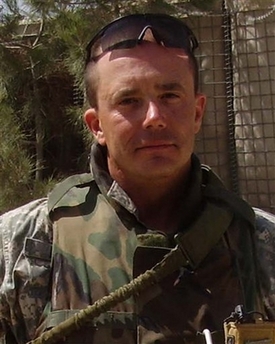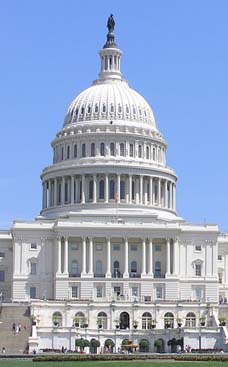
Robert Paul died September 8 of this year when a suicide car-bomber struck his Humvee in Kabul, Afghanistan. Sgt. Paul was in his third year of active duty in the Army reserves and had completed two years in Iraq commanding a civil affairs unit in Baghdad. Paul had also served in Peace Corps in Kenya and last year, while studying Thai at the Defense Language Institute in Monterey, joined a 2005 e-mail debate peacecorpsonline.com (sic) about Peace Corps as an incentive for military recruitment. These are excerpts of his side of the discussion.
"Peace Corps Online" and NPCA collaborate on story "Snowshoe Bob" in Worldview Magazine
SHOWSHOE BOB
The last word from Sgt. Robert Paul on military and Peace Corps
by Robert Paul
Robert Paul died September 8 of this year when a suicide car-bomber struck his Humvee in Kabul, Afghanistan. Sgt. Paul was in his third year of active duty in the Army reserves and had completed two years in Iraq commanding a civil affairs unit in Baghdad. Paul had also served in Peace Corps in Kenya and last year, while studying Thai at the Defense Language Institute in Monterey, joined a 2005 e-mail debate peacecorpsonline.com about Peace Corps as an incentive for military recruitment. These are excerpts of his side of the discussion.
Sunday, September 4, 4:20 a.m.
I was a volunteer in Kenya (87-89). Maybe eight years later I joined the Army Reserves. I recently returned from Baghdad where I did civil affairs missions for a tour of duty. This was much shorter than my two-year tour with the Peace Corps. Probably just as dangerous, considering I did not get killed in either location and came close more often than I probably realized. Granted, I came very close in Baghdad.
I was very good at my job in the army as a civil affairs specialist. Much of my skill at working with community groups was learned directly from my Peace Corps experience.
Thursday, September 8, 5:38 a.m.
I drove around helping community groups work toward common civil goals like trash cleanup, sewage repair, potable water issues and participating in public meetings. It was all very simple, except that people tried to kill us. It seemed that terrorists wanted to kill or maim every government representative to send their message.
Saturday, September 10, 9:38 p.m.
There are only a couple of differences between serving as a civil affairs specialist in Iraq and a community development technician in Kenya. First, in Iraq I traveled with a team and we were armed. We drove in a couple of busted-up Humvees. I had a group of from six to eight soldiers: I lost a couple to roadside bomb attacks, but they did not die. In Kenya, I was alone and had no need for any type of weapon. I did have a mountain bike.
Second, in Iraq I had lots and lots of money. This made getting projects done a whole heckuva lot easier because we were basically ordered to improve infrastructure from city sewage to classrooms with a warehouse full of money that we-the United States, not me personally-captured from Saddam. The only stipulation was that the project had to have community benefit and the money was to be paid directly to the Iraqi contractor who was awarded the bid.
I had to find my own funding source in Kenya. Took a little longer.
Never arrested civilians or interrogated them. I was not looking for any information. It was pretty obvious what was broken and rundown. Saddam did absolutely no maintenance on his cities. Everything was broken or about to break. I had expected to do a lot of repair from military actions. Not at all. Those building were, for the most part, destroyed. I was performing maintenance and repair on systems that were not maintained for decades. They were also poorly designed. Naturally, I worked with community groups and the like to get projects aimed at what civilians wanted most rather than what I thought they should want most.
I ate at restaurants and houses frequently. Most soldiers do not. I frequented public markets and shopped for fruits and vegetables. Most soldiers do not. I built trust the same way I did in the Peace Corps. I answered questions from regular people and chatted with them. They asked the same questions you would expect. �Why are you here?� �Are you a spy?� �Can you give me something?� Some people trusted us, and many did not.
We talked about politics, sports, culture. There was no difference between Iraqis in Baghdad and people in any other urban population except they spoke a strange language and had different customs. Much like I would expect from some random person from Chicago or New York City.
In terms of intel, what is there to know? I know that the news media does not tell anybody in the United States what is going on in Iraq. All I see is soldiers driving around getting blown up or shot at. Most recently it is the Iraqis getting blown up and or shot at. That is about as detailed as it gets.
I would guess that any decent Iraqi or �insurgent� intelligence specialist knows and will know a whole lot more than almost any soldier in Iraq.
Then again, I am sort
of odd by army standards because I was in the Peace Corps. So everyone thinks I am politically and socially liberal and most likely smoked a lot of weed.
The basic difference between the services is that you were mostly alone in the Peace Corps and in the Army you are never never never ever alone.
Monday, September 12, 9:26 p.m.
We only really got attacked with any effect once. That was a roadside bomb that blew my third vehicle off the road and scattered some of my soldiers around. There was not much to tell. I mean, we got blown up. It happened every day about 20 to 70 times a day. No more than a couple to maybe 10 or so would get killed. This was all reported by CNN.
Most likely any Peace Corps volunteer working in Iraq with any topic that involved promotion of women's rights would be killed pretty quick. There was a returned Peace Corps volunteer from Namibia who worked with women's rights for some non-governmental organization who got herself killed in Iraq. She was killed merely because of the topic of her efforts. Really, there is just not that much mystery to what is happening in Iraq. I think that most Iraqis are more familiar with our activities than most Americans. First, most Americans probably don't care. Second, most news networks are more interested in blood stories than anything else, so most of the activities don't get reported.
Wednesday, September 14, 3:01 p.m.
I am now learning Thai in California. I certainly cannot complain about that. I left Iraq about eight months ago and found myself driving south to California to learn a foreign language two weeks later. I've been here for almost a year.
The military is far from a bad place or a bad job. It just gets a little weird now and again due to the bureaucratic nature of the organization and the largely held public belief that it sort of free-wheels around. We do have the best-equipped and most thoroughly trained army in the world. It has people that are unbelievably intelligent as well as people that are as dumb as a box of rocks. I think any successful corporation, business, NGO, religious organization or whatever can say pretty much the same thing. The only real difference is that the military gives you guns and we get killed-and kill-as part of our collective job.
Wednesday, September 28, 10:41 p.m.
The military is not merely sent into a country and given carte blanche to romp around and do as they please. They certainly don't invade first and call the President once they secured some other nation's capital and let him know. There is always a political goal. A Peace Corps volunteer has one heckuva lot more autonomy, but they really have no resources and are not liable to do too much too far out of line from what the politicians want them to accomplish. I mean, how much trouble can you get into with 10 bags of concrete mix, two shovels and a homemade wheelbarrow? Okay, I could get in a lot.
As a soldier, you probably have a couple of Humvees, lots of rifles and bullets, some grenades, some form of anti-tank weapon, and you are wearing body armor and you are the police. You can do a lot of political damage in less than a month.
I do hope to return to my house in Oregon one day soon. I have no idea why I am learning Thai, but that is the kind of language you really can't complain about. So it looks like the Peace Corps taught me Swahili and Luo; the army taught me Thai. Why doesn't anybody teach me something I can use back home like Spanish? Do you have any idea how many Swahili, Luo, and/or Thai speakers are in eastern Oregon? One. That's how many.
Saturday, October 1, 5:47 p.m.
I can carry around a very loud speaker and tell people to get away from wherever they are because two conflicting armies are about to greet each other and hanging around would be a bad idea. Basically, you tote around the heaviest loudspeaker modern science can devise and put out information. �Clean water that direction. Medical supplies, that direction. If you know where landmines are, let anyone in a pickle suit know so we can have them removed. Or, landmines have been found in that direction so make sure you stay out and keep your kids out.�
I think that psychological operations developed mostly in the Vietnam war and their job was different. I think they were more focused on deceptions and intelligence gathering than currently. I suppose if I put my mind to it, I could put a speaker on top of my Humvee and drive around in the dirt dragging some chains and playing a recording of moving tanks. This might deceive the enemy into attacking my position. The only problem with that idea is what would I do if it worked?
Tuesday, October 18, 8:41 p.m.
I will learn this language and, hopefully, return to urban planning without extended interruptions. Until then, I will just continue to burrow myself into my textbooks on the top of this cold, cold, hill.
Thursday, October 20, 3:04 p.m.
As a returned Peace Corps volunteer, I am greeted with a bit of scorn in the military. However, when civil affairs missions come into play, it is quickly recognized that I have developed considerable skill from the Peace Corps experience. I still get the scorn, but I do receive some degree of respect for accomplishing things that were not expected to get accomplished. And certainly not by me.
Saturday, October 29, 3:19 p.m.
The issue had always seemed to me that allowing military to enter the Peace Corps as priority applicants as part of their military contract � would further complicate itself by blurring the distinction between the military and the Peace Corps. This is a significant issue for me.
Monday, October 31, 3:11 p.m.
At this point in time I don't have a home. I pay a mortgage on one in Oregon and my employer has been holding my job, but I really don't remember much more about the place. Friends move on, family moves on, time moves on. Those memories fade awful quickly.
I guess I will volunteer to go back to Iraq. It is not that I want to go back there, but I have no idea what to do next and there is always room on that bus. Besides, in the military you make friends real quick because you have no other life.
Looking back over what I just wrote, it looks kinda pathetic. Maybe I'll just take a vacation to Thailand and see if this school merits its reputation.
Thursday, November 3, 10:03 p.m.
If you cannot or fail to stop very bad things from happening, the least you can do is try to make things better. In the Peace Corps, we were placed in urban or rural areas fairly isolated from our other volunteers. Our jobs were as broad or narrow and as difficult as we could handle. One thing the Peace Corps never trained me to do was to eliminate entire classifications of people because I did not agree with their decisions, politics, or religious beliefs. One of the main purposes in Peace Corps seemed to be to try to grasp the unfamiliar culture and work within the cultural limits. As it just happens, I do that in the military, with the military. It is interesting to me that people in the military hold Peace Corps in a lot of disdain. This is mostly due to their gross ignorance of the Peace Corps.
Monday, December 12, 9:36 p.m.
Rob Shultheis has written a book about a special operations civil affairs mission in Baghdad. It talks about the folks on a team doing civil affairs missions in northwest Baghdad. It is called, Waging Peace: A Special Operations Team Battle to Rebuild Iraq. I was on that team, so there are nice little pictures of me and the rest of us out there. Rob is a pretty good guy, too. I should know because he lived with me for months.
I don't get it. A soldier wears a uniform and carries a weapon and travels in groups with expensive equipment in expensive vehicles, with lots of red tape. A Peace Corps volunteer is usually alone on a bicycle wearing a t-shirt making decisions and commitments in a heartbeat. I did both just like that.
Why can't dissimilar organizations work on similar goals? Me, I am just looking to pack my pickup and say goodbye to Monterey as fast as I can. The Army, too, but don't tell anyone.
For more about Sgt. Robert Paul and his Army Reserve Special Operations tactical unit, read Waging Peace: A Special Operations Team's Battle to Rebuild Iraq, by Rob Schultheis, published by Gotham Books. StatCounter - Free Web Tracker and Counter


















